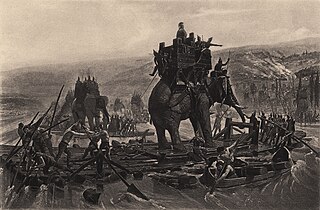
The 3rd century BC started the first day of 300 BC and ended the last day of 201 BC. It is considered part of the Classical Era, epoch, or historical period.
This article concerns the period 229 BC – 220 BC.
Year 241 BC was a year of the pre-Julian Roman calendar. At the time it was known as the Year of the Consulship of Atticus and Cerco. The denomination 241 BC for this year has been used since the early medieval period, when the Anno Domini calendar era became the prevalent method in Europe for naming years.
During the 290s BC, Hellenistic civilization begins its emergence throughout the successor states of the former Argead Macedonian Empire of Alexander the Great, resulting in the diffusion of Greek culture throughout the Levant and advances in science, mathematics, philosophy, etc. Meanwhile, the Roman Republic is embroiled in war against the Samnites, the Mauryan Empire continues to thrive in Ancient India, and the Kingdom of Qin in Ancient China, the one which in the future will conquer its adversaries and unite China, begins to emerge as a significant power during the Warring States period.
This article concerns the period 289 BC – 280 BC.
This article concerns the period 279 BC – 270 BC.
This article concerns the period 269 BC – 260 BC.
This article concerns the period 259 BC – 250 BC.
This article concerns the period 249 BC – 240 BC.
This article concerns the period 239 BC – 230 BC.
This article concerns the period 169 BC – 160 BC.
This article concerns the period 199 BC – 190 BC.
Year 246 BC was a year of the pre-Julian Roman calendar. At the time it was known as the Year of the Consulship of Crassus and Licinus. The denomination 246 BC for this year has been used since the early medieval period, when the Anno Domini calendar era became the prevalent method in Europe for naming years.
Year 226 BC was a year of the pre-Julian Roman calendar. At the time it was known as the Year of the Consulship of Messalla and Fullo. The denomination 226 BC for this year has been used since the early medieval period, when the Anno Domini calendar era became the prevalent method in Europe for naming years.
Year 228 BC was a year of the pre-Julian Roman calendar. At the time it was known as the Year of the Consulship of Ruga and Verrucosus. The denomination 228 BC for this year has been used since the early medieval period, when the Anno Domini calendar era became the prevalent method in Europe for naming years.
Year 262 BC was a year of the pre-Julian Roman calendar. At the time it was known as the Year of the Consulship of Valerius and Otacilius. The denomination 262 BC for this year has been used since the early medieval period, when the Anno Domini calendar era became the prevalent method in Europe for naming years.
Year 276 BC was a year of the pre-Julian Roman calendar. At the time it was known as the Year of the Consulship of Gurges and Clepsina. The denomination 276 BC for this year has been used since the early medieval period, when the Anno Domini calendar era became the prevalent method in Europe for naming years.
Year 275 BC was a year of the pre-Julian Roman calendar. At the time it was known as the Year of the Consulship of Dentatus and Caudinus. The denomination 275 BC for this year has been used since the early medieval period, when the Anno Domini calendar era became the prevalent method in Europe for naming years.
Year 281 BC was a year of the pre-Julian Roman calendar. At the time it was known as the Year of the Consulship of Barbula and Philippus. The denomination 281 BC for this year has been used since the early medieval period, when the Anno Domini calendar era became the prevalent method in Europe for naming years.
Year 286 BC was a year of the pre-Julian Roman calendar. At the time it was known as the Year of the Consulship of Corvus and Paetus. The denomination 286 BC for this year has been used since the early medieval period, when the Anno Domini calendar era became the prevalent method in Europe for naming years.
